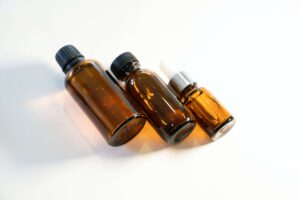Your Skin’s Best Allies

In the pursuit of radiant, healthy skin, the power of natural ingredients cannot be overstated. When it comes to skincare, non-comedogenic oils stand out as heroes, offering a wealth of benefits without clogging pores. If you’re ready to elevate your beauty routine and harness the nourishing properties of non-comedogenic oils, this comprehensive guide will unveil the secrets to a luminous complexion. Explore the diverse world of non-comedogenic oils and discover why these elixirs deserve a prime spot in your beauty arsenal.
Understanding Non-Comedogenic Oils
Defining Non-Comedogenic
The term “non-comedogenic” refers to substances that do not clog pores or contribute to the formation of comedones, which are the precursors to acne. Non-comedogenic oils are lightweight, fast-absorbing, and compatible with various skin types, making them ideal for those prone to breakouts or with sensitive skin.
The Role of Fatty Acids
Non-comedogenic oils are rich in essential fatty acids, such as linoleic acid, which play a crucial role in maintaining the skin’s barrier function. These oils nourish and hydrate the skin without causing congestion, promoting a balanced and radiant complexion.
Non-Comedogenic Oils for Your Beauty Arsenal
- Jojoba Oil: Jojoba oil, often referred to as nature’s multitasker, closely resembles the skin’s natural sebum. Rich in vitamins E and B-complex, it balances oil production, soothes inflammation, and provides deep hydration without clogging pores. Its lightweight texture makes it suitable for all skin types.
- Argan Oil: Hailing from the kernels of the argan tree, argan oil is a non-comedogenic gem. Packed with antioxidants, essential fatty acids, and vitamin E, it nourishes the skin, boosts elasticity, and helps regulate sebum production. Its luxurious feel makes it a favorite for promoting a radiant complexion.
- Grapeseed Oil: Extracted from grape seeds, grapeseed oil is a non-comedogenic marvel rich in linoleic acid. Known for its astringent properties, it helps tighten pores, balances oil production, and provides antioxidant benefits. Grapeseed oil’s lightweight consistency makes it an excellent choice for those with oily or acne-prone skin.
- Rosehip Oil: Rosehip oil, derived from the seeds of rosehips, is celebrated for its skin-renewing properties. Packed with vitamins A and C, as well as essential fatty acids, it helps fade scars, hyperpigmentation, and fine lines. Its non-greasy texture and regenerative qualities make it a staple for nourishing the skin.
- Squalane Oil: Squalane oil is a hydrogenated form of squalene, a natural component of human sebum. Derived from olives or sugarcane, squalane is highly compatible with the skin’s lipid barrier. It provides intense hydration, boosts skin elasticity, and enhances a natural, dewy glow.
- Hemp Seed Oil: Hemp seed oil, extracted from the seeds of the hemp plant, is an omega-3 and omega-6 fatty acid powerhouse. It helps balance oil production, soothes inflammation, and provides essential nutrients for healthy skin. Its lightweight texture makes it suitable for daily use without clogging pores.
- Sunflower Seed Oil: Sunflower seed oil is a non-comedogenic option rich in linoleic acid and vitamin E. With its emollient properties, it moisturizes the skin without leaving a greasy residue. Sunflower seed oil is particularly beneficial for dry or sensitive skin, promoting a soft and supple complexion.
- Sweet Almond Oil: Sweet almond oil, extracted from the kernels of almonds, is a non-comedogenic oil rich in vitamins A and E. It nourishes and conditions the skin, improving overall complexion. Its mild, hypoallergenic nature makes it suitable for even the most sensitive skin types.
Incorporating Non-Comedogenic Oils into Your Routine
Patch Test First
Before fully incorporating a new non-comedogenic oil into your routine, conduct a patch test to ensure compatibility with your skin. Apply a small amount to a discreet area and monitor for any adverse reactions.
Customize Your Blend
Experiment with creating your custom oil blend by combining a few drops of different non-comedogenic oils. This allows you to tailor your skincare routine to address specific concerns and enjoy a diverse range of benefits.
Use as a Makeup Remover
Non-comedogenic oils are excellent for removing makeup, including stubborn eye makeup. Apply a small amount to a cotton pad and gently wipe away makeup, leaving your skin clean and nourished.
Hydrate and Seal
Incorporate non-comedogenic oils into your routine as a final step to seal in moisture. Applying a few drops over your moisturizer helps lock in hydration, leaving your skin supple and protected.
Addressing Common Concerns
Won’t Non-Comedogenic Oils Make My Skin More Oily?
Contrary to the misconception that oils exacerbate oiliness, non-comedogenic oils can actually help regulate sebum production. These oils mimic the skin’s natural lipids, signaling to the skin that it has enough oil, thus reducing excess oil production.
I Have Acne-Prone Skin – Can I Still Use Non-Comedogenic Oils?
Absolutely. In fact, non-comedogenic oils can be a game-changer for acne-prone skin. Oils like jojoba, grapeseed, and squalane can help balance oil production, soothe inflammation, and provide essential nutrients without causing breakouts.

The world of non-comedogenic oils is a treasure trove for those seeking radiant, healthy skin without the fear of clogged pores. By incorporating these oils into your beauty arsenal, you’re not only embracing the wisdom of nature but also unlocking the transformative power of nourishment. So, bid farewell to concerns of pore congestion, and welcome the luminosity that non-comedogenic oils can bestow upon your skin. Your radiant, nourished complexion awaits – it’s time to elevate your beauty routine with the goodness of non-comedogenic oils.




